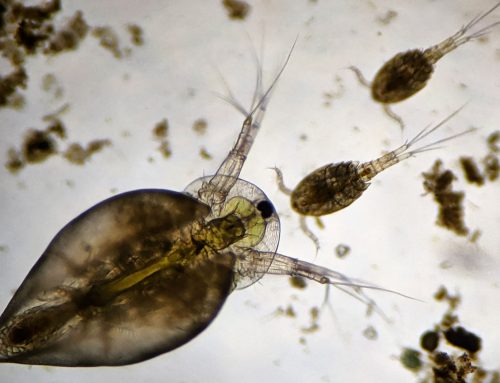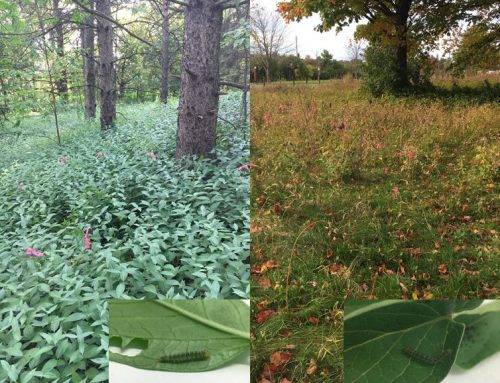Our Backyard Garden was the hot spot for pollinators on this sunny July afternoon.
by Sandy Garland
The only way to learn to identify pollinators is to keep looking for them. As a member of the Wild Pollinator Partners network, the FWG has been participating in a number of pollinator surveys this year. We want to find out which pollinators are visiting our plants and we want to learn more about these helpful creatures.
On 21 July 2019, a hot sunny day, I met with Emma Gaudreault, Véronique Landriault, and Fatiha Dia Hantchi to do a survey. All three are Ottawa U students, but Emma is working on a project at Agriculture and Agri-foods Canada this summer and has received a small grant from the Ottawa Field-Naturalists’ Club to expand on her work. We could tell she was a “pro” when she arrived with a butterfly net and small vials to enable us all to get a closer look at some of the insects we would find.
Véronique agreed to be recorder and used the form that another Ottawa U student, Alysha Riquier prepared for the purpose (see pollinator survey protocol – and form in English and French).
The Andrenid bees that were everywhere during an earlier survey at the end of June were mostly gone, but we found many flower flies and bumble bees. Although we surveyed the Backyard Garden, the Butterfly Meadow, and the Gully, the BYG was definitely most popular with pollinators. And the favourite plant: Great St. John’s-wort (Hypericum ascyron), which is native in our region.
Here’s a sample of the pollinators we found. Thanks very much to Emma and Fatiha for taking these photos. They have been uploaded to the WPP project in iNaturalist and we’ll add further identifications if they are confirmed by that community.
Thanks also to Isabelle Nicol and the Friday volunteer group at the FWG for keeping this garden looking so beautiful and making it so attractive to these pollinators.
- Possible Drone Fly, Eristalis tenax (by Fatiha).
- Toxomerus sp. (by Fatiha)
- Carpenter bee, Xylocopinae sp. (by Emma)
- Common Red Soldier Beetle, Rhagonycha fulva (by Emma)
- A blister beetle, Nemognatha sp. (by Emma)
- Monarch butterfly (Danaus plexippus) on Swamp Milkweed in the Gully (by Emma)
- A species of cellophane bee (by Emma)
- Ligated Furrow Bee, Halictus ligatus (by Emma)
- Another view of the furrow bee (by Emma)
- Hylaeus sp. (by Emma)
- Bumble bee, Bombus sp. (by Emma)
- A bee in the Apoidea family (by Emma)
- A bee in the Apidae family (by Emma)
- Anthophila sp. (by Emma)
And here’s a summary of the data:
Date and time: 21 July 2019, 1:09-2:42 pm
Air temperature at start: 29 degrees C; at end of survey: 20 degrees C
Wind speed: 19 km/h
Cloud cover: 10-50%
| Location | No. | Pollinator | Plant species | |
| Backyard Garden | 1 | Western Honey Bee, Apis mellifera | Black-eyed Susan | |
| 1 | Bumble bee | Fireweed | ||
| 1 | Wasp (all black) | Mountain Mint | ||
| 3 | Sweat bee (Halictus sp.) | Black-eyed Susan | ||
| 1 | Sweat bee (Lasioglossum sp.) | Yarrow | ||
| 15 | Sweat bee (Lasioglossum sp.) | Queen Anne’s Lace | ||
| Various ants and small beetles | Queen Anne’s Lace | |||
| 1 | Flower fly (Toxomerus sp.) | Queen Anne’s Lace | ||
| 1 | Small carpenter | Mallow | ||
| 2 | Large carpenter | Wild Bergamot | ||
| 1 | Small carpenter | Silverweed | ||
| 2 | Beetle | Rue and Black-eyed Susan | ||
| 5 | Little black bee, pollen on stomach | Harebell | ||
| 2 | Bumble bee | Great St. John’s-wort | ||
| 10 | Hylaeus | Great St. John’s-wort | ||
| 1 | Lasioglossum | Wild Bergamot | ||
| 3 | Big carpenter bee | Cup-plant | ||
| 10 | Hylaeus | Potentilla | ||
| Butterfly Meadow | 1 | Bumble bee | Vetch | |
| 1 | Western Honey Bee, Apis mellifera | Veronica | ||
| 1 | Western Honey Bee, Apis mellifera | St. John’s-wort | ||
| 1 | Hylaeus | Purple-flowering Raspberry | ||
| 2 | Honey bee, Apis mellifera | Sweet clover | ||
| Gully | 2 | Monarch | Swamp Milkweed | |
| 3 | Western Honey Bee, Apis mellifera | Swamp Milkweed | ||
| 2 | Western Honey Bee, Apis mellifera | Catmint | ||
| 3 | Sweat bee | Catmint | ||
| 2 | Megachile | Catmint | ||
| 2 | Large sweat bee | Catmint | ||
| 1 | Drone fly, Eristalis tenax | Resting | ||
| 1 | Flower fly, Toxomerus | Daisy Fleabane |






















The new Seek App by iNaturalist would be a great tool for amateurs and professionals to identify and monitor pollinators and other wildlife.